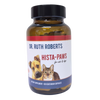As more pet owners turn to holistic pet health, professionals like Cat Johnston are leading the way by combining traditional veterinary medicine with natural, integrative approaches. In this insightful journey, Cat, a licensed veterinary technician (LVT) and certified holistic pet health coach, shares how her experiences have shaped her understanding of nutrition for dogs and nutrition for cats and how she now advocates for whole food diets and natural remedies to promote optimal health for pets.
The Shift from Traditional to Holistic Pet Health
For over 15 years, Cat worked in the conventional veterinary field, but she began noticing gaps in the standard approach to treating pets, particularly when it came to nutrition. "We weren’t taught much about the connection between nutrition and overall health in vet tech school," she recalls. “Our information mainly came from pet food companies that often promote processed kibble."
Cat’s personal journey and professional experiences led her to explore the power of holistic pet health and how whole food for dogs and whole food for cats can drastically improve pets' lives. Her transition to holistic care became evident when she realized that many health issues, like dog skin allergies and cat skin allergies, could be managed more effectively with natural remedies and an improved diet.
Nutrition: The Foundation of Holistic Pet Health
Cat’s experience has taught her that diet is the cornerstone of long-term pet health. She emphasizes that processed kibble, which is often marketed as a solution to pet health problems, can sometimes exacerbate issues like skin allergies, joint pain, and digestive problems.
"In the holistic world, we see a direct link between diet and overall health," Cat explains. “In veterinary medicine, the focus tends to be on prescription diets and quick fixes, but these are often just temporary band-aids.” Many of the top prescription diets include hydrolyzed proteins and fillers like corn or soy, which may alleviate symptoms temporarily but do not offer the long-term benefits of a whole-food, nutrient-rich diet.
Cat teaches canine nutrition at a local college, where she opens the eyes of future vet techs to the importance of diet in maintaining a pet’s health. She believes that more education on nutrition could drastically change how pets are treated in veterinary medicine. “I want my students to understand the true value of nutrition and how a whole-food diet can prevent many chronic conditions,” she says. This educational shift could help future vet techs and veterinarians provide more comprehensive care, reducing reliance on processed kibble and offering healthier alternatives for pets.
Holistic Pet Health Coaches: Complementing Veterinary Care
Cat emphasizes that holistic pet health coaches don’t replace veterinarians—they complement them. While vets focus on diagnosing and treating specific conditions, holistic coaches guide pet owners in incorporating whole food, natural remedies, and holistic care into their pets' everyday lives.
“We work alongside veterinarians to provide additional support through diet, supplements, and lifestyle changes," Cat explains. "For example, we recommend natural remedies for dogs and natural remedies for cats that can reduce the reliance on medications.”
Supporting Diagnostics and Treatment with Holistic Insights
Cat's role also includes helping pet owners understand diagnostic results, such as bloodwork, in the context of holistic pet care. For instance, she explains that slightly elevated kidney values in a pet on a high-protein, whole-food diet may not indicate disease but simply reflect the pet's dietary intake.
"By reviewing diagnostics alongside the vet's treatment, we can offer integrative pet care that addresses the root causes of health issues,” Cat says. "Our goal is to help pet owners make informed choices based on nutrition, lifestyle, and natural treatments.”
Managing Chronic Conditions with Holistic Solutions
In her practice, Cat has seen many pets benefit from holistic veterinary care for chronic conditions like arthritis, allergies, and digestive issues. Often, issues like dog skin allergies and cat skin allergies can be alleviated by addressing underlying gut health through whole-food diets and natural supplements.
"When we improve the gut, we improve overall health," Cat notes. "We see skin clear up, energy levels increase, and chronic inflammation decrease."
Natural Flea Prevention: A Holistic Approach
Another area where Cat recommends a natural, holistic approach is in flea prevention. While traditional flea treatments rely on chemicals and pesticides, Cat advocates for natural flea prevention for dogs and natural flea prevention for cats.
“We use methods like adding garlic to the diet, amber collars, and natural flea prevention sprays to repel fleas and ticks," Cat says. "These natural solutions are gentler on pets' systems and reduce the risk of harmful side effects.”
Working with Veterinarians for Integrative Care
Cat highlights the importance of collaboration between holistic pet health coaches and veterinarians. While veterinarians diagnose and treat illnesses, holistic coaches provide ongoing support for nutrition, natural supplements, and lifestyle changes. This integrative approach leads to holistic veterinary care that supports the whole animal, not just the symptoms.
“Vets don’t have the time to dive deeply into every aspect of a pet’s care, especially when it comes to nutrition and supplements," Cat explains. "That’s where we come in to bridge the gap and provide more holistic, day-to-day care."
Conclusion: The Power of Holistic Pet Health
Cat Johnston’s journey from traditional veterinary medicine to holistic pet care has made her a powerful advocate for integrative pet care. Her focus on whole-food diets, natural remedies, and holistic support has transformed the way she helps pets, especially those dealing with chronic conditions like allergies and digestive issues.
For pet owners looking to enhance their pets' health through a holistic approach, Cat’s advice is clear: start with nutrition. "It’s the foundation of everything,” she says. "With the right diet and natural support, we can prevent and manage many of the common health issues that pets face today.”
















